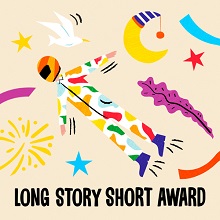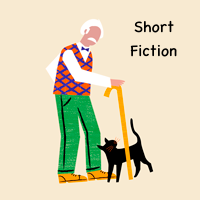"Maddy, we've got some very exciting news to tell you," said Mom and Dad.
And I was very excited. I was sure it was a dog! They'd promised.
"You're going to have a little brother or a little
...
[+]
I have never reincarnated as one of the elite, never experienced true acceptance. But even when I lived as marginalized, in my first two lives I had my privileges. In my first life I could love whoever I wanted. The imposed idea of only two genders and only being able to love the opposite of those two, did not exist. I fell in love with another woman, Xōchitl, as she was known in that first life. Our souls always reunite. What we created together was beautiful. As humble and respected healers in our community, we cured the ailments of our people. Their deep trust in us is something I will never forget; it was rare for such a big community. It was a level of emotional intimacy which I have never experienced in a community since.
My life now, as a stone in a tranquil creek, reminds me of the vast lake we lived by, in which we worshipped the powerful Metztona, goddess of the moon, death, and of the waters. I would swim to her island to leave my offerings, the movement of the lake’s waters enveloping me in their healing, in their magic, relieving me of all my burdens. Just like the gentleness of the creek. Water has always been my comfort, my peace, no matter how turbulent.
In my second life, we would teach the village children how to fish. I’ll never forget those mornings. Tonatiuh, the sun, would be just brushing past metztli, their light bringing forth a new beginning for us all. As the sun and the moon danced across the early morning sky, the lake before us would be illuminated across the surface, the rainbow of blues and greens graced us with their appearance as the fresh water embraced our weary feet to welcome us. The children would close their eyes, breathing in the gift of tranquility and thanking the gods, the fish, the lake, and all our surroundings. Grabbing their harpoons, they would run into the lake squealing in joy. I remember the joy of their excited little screams at seeing the fish swim away, their sense of wonder always amazed me. Xōchitl could never hold back her laughter when they did this, it was always so infectious. We would collapse onto each other's frame, attempting not to tumble down giggling. We never won; we would become too intoxicated with each other’s laugh. Such moments of ridiculous euphoria almost made Xōchitl and I feel like mothers, even if nature would never be able to gift us biological children, for a few hours each morning we felt the joy of motherhood. Things weren’t perfect in those lives, but we were happy.
Perhaps that’s why in my third life I was returned to the ancestral lands of previous lives, as a woman who was born and chased into the shadows of colonial society. I had to grow; my soul was still so young. At least that’s what I tell myself, I want to believe my suffering had a higher purpose. My only liberation in my third life was my connection to the gods, to Mother nature, to the underworld. We were almost one, the dead spoke through me and I acted through them. I lived entrapped in the rigid confines of my colonial casta classification; there was no escaping that. But my small taste of liberation was enough to keep me hopeful. My mother and father said death was our only chance at freedom, “for everyone is equal in death.” Living in the margins of my ancestral lands, my history almost wiped from existence, practicing the medicine and magic of my ancestors in secret, disguised as worship to the colonial god, was worse than if I had been burned alive. I watched as my parents who once so lovingly made offerings to Tonantzin, our great mother, learned the colonizer’s prayer. Their beautiful brown hands shaking as they clasped their rosaries that seemed to come out of nowhere, yet came from everywhere. They would kneel in front of the priest, along with Xōchitl and her family. Their faces an uneven mixture of guilt and fear. The priest would start the prayers in our language at first. Slowly as time went on the prayers would have more and more of the colonizer’s language. And it was with each forced prayer to the conquistador’s god that the cries of my ancestors engulfed me. They cried betrayal.They cried injustice. So did our people. I could see it in the shaking hands of my parents, the empty look in their eyes. I could hear it in their sobs every night and morning.The days were no longer a blessing, because they thought the gods abandoned our people, that we were being punished. This haunts me. And so does the image of my beloved Xōchitl being married off to a Spaniard, the son of a colonizer. The image of her being forced to take his hand is burned into me. Trying as hard as I do, I can never seem to erase it. The obsidian waterfall that was her hair was braided in a knot the way the feminine Criollo wore it. Her ceremony dress was as white as the invaders, yet it reminded me of our priestesses; I never knew that same colour that had once brought me so much healing, could bring me so much pain. I was one of many servants at the ceremony, and was put in charge of her for the day. Alone with her before the ceremony, I used my fingers as a comb. Brushing her hair, making sure to stroke ever so gently. She always asked me to when she needed comfort. Now, she only closed her eyes, her chest rising and falling, tears overflowing. Her silent screams echoed through me. We couldn’t even kiss one last time, for fear robbed that from us. The invaders robbed that from us. And as much as I longed for the comforting release of death, as much as I desired to be reunited with Xōchitl and swim in the lake’s waters to Metztona’s island, I knew I had to heal my people in whatever way I could. And so, I lived, and I healed, and I loved, and I worshipped the gods of my ancestors until my very last breath. Until the colonizers found me out.
Even now living as a stone, centuries after, I hear the cries of this stolen land I reincarnated in with its many colonized peoples. I can’t help but hear the cries of my ancestors in previous lives. Who although entire lives, lands, and centuries away, still call out to me. Mictēcacihuātl gave me the rest I so desired in the underworld, here in the in-between realm of Earth. Perhaps so that I can heal and take my power back in the same plane of existence from which my spirit withered away. But I cannot heal, no matter how calm the waters or how radiant the light of the moon and the sun. I am now part of the land which has been stolen, beaten, drained, and killed. But my sobs cannot be heard by anyone but myself. For the only heart anyone sees is the shape of my hard exterior. I am voiceless, but not silent; still, but fighting. I will not let these lands and its peoples perish. The fight must continue, and it will. Perhaps this is the path Mictēcacihuātl is leading me on. My purpose.



